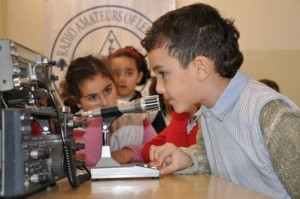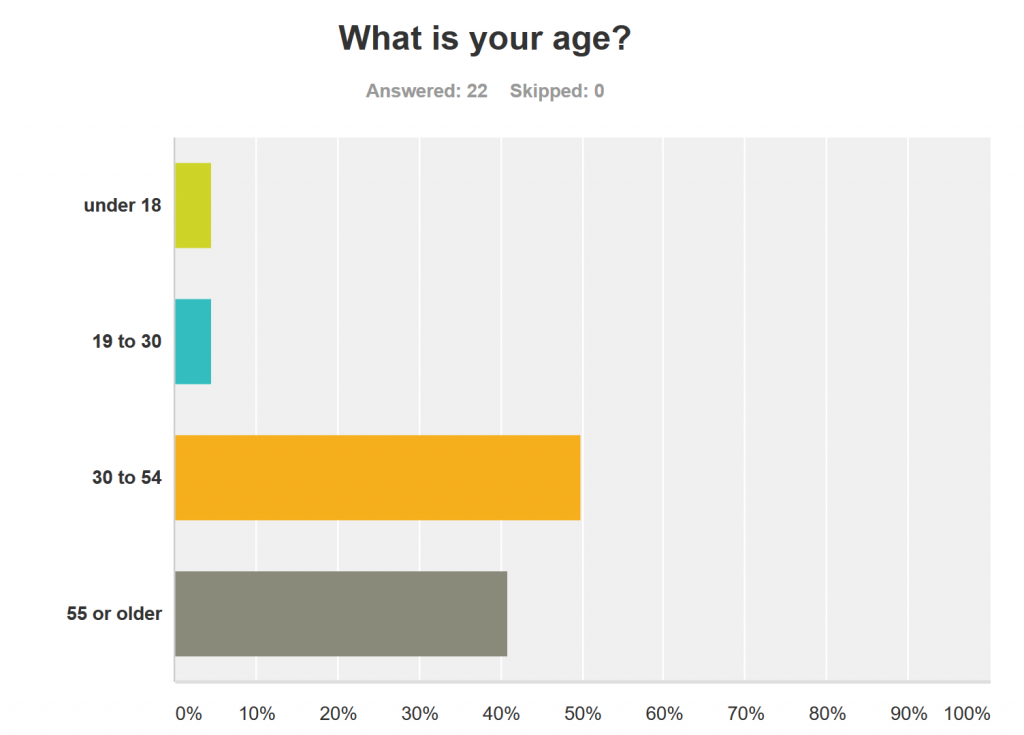 Kids are Not the Future of Ham Radio
Kids are Not the Future of Ham Radio
 You’ve heard it a million times: our kids are the future. That statement gets applied to almost everything, including amateur radio. How can you argue with an obvious fact like that?
You’ve heard it a million times: our kids are the future. That statement gets applied to almost everything, including amateur radio. How can you argue with an obvious fact like that?
But I am starting to think it is incorrect.
We’ve had really good success on creating new hams of all ages in our Technician License Class (at the Tri-Lakes Monument Radio Association). We’ve been doing this for a while now and I think I am seeing a pattern emerge. We’ve been able to attract middle schoolers to the class and help them get their ham radio license. I’ve talked to many of them on the air. They’ve helped out with public service events. They seem to have fun playing with radios.
Then this thing called high school happens. The high school phase in the US is filled with tons of stuff to do: studying, homework, AP classes, science competitions, sports, dating, movies, driving and after school jobs. Way too much stuff. Ham radio starts to take a backseat to these normal high school activities. Then we don’t see the kids at the radio club meetings or chatting on the local repeater because they are busy doing other things. Have we lost them forever? Not sure.
High school is often followed by college which has its own set of challenges: a totally new environment, away from home, a new set of people, new studies, etc. There might be a ham radio club on campus but maybe not. If a kid is not off to college they are (hopefully) out doing something to establish themselves in this world. Eventually they emerge on the other side, get a job, get themselves established, sometimes with a spouse and maybe a kid or two. By this time they are 25 to 30 years old, depending on the individual.
I recently posted about the demographics of our students in the Tech License Class. The chart below shows the age distribution of our students from our most recent class. Hmmm, clearly most of our students are 30 or older. (Sorry, we have not collected age data with finer resolution.) This particular class is light on the under 18 crowd…sometimes we have a clump of kids in the mix.
 For whatever reason, it seems that most people find themselves in a situation as an adult that causes them to say “I want to get my ham radio license.” When asked why they want to get their ham license, the top response is always emergency/disaster communications, followed by backcountry communications, pursuing electronics as a hobby and learning about radio communications. I suspect that starting to be established in a community and having some disposable income also play a role.
For whatever reason, it seems that most people find themselves in a situation as an adult that causes them to say “I want to get my ham radio license.” When asked why they want to get their ham license, the top response is always emergency/disaster communications, followed by backcountry communications, pursuing electronics as a hobby and learning about radio communications. I suspect that starting to be established in a community and having some disposable income also play a role.
My hypothesis is that the most effective way of growing a vibrant ham radio community is to target adults ages 25 to 40.
This age range is more equipped and ready to be ham radio operators and are still young enough that they will be around for a while. Of course, we still want to work with all age groups, including kids and retirees. We’ve all seen very young hams get the bug for ham radio early and carry it throughout their life. And we also see plenty of older folks get interested in the hobby as they approach or enter retirement. We don’t want to miss out on either of those groups.
So that’s my read on the situation. I’ve got some data to support my theory but I can’t really prove it. What do you think? What are you seeing in your ham radio community?
73, Bob KØNR
The post Kids are Not the Future of Ham Radio appeared first on The KØNR Radio Site.














I agree, I received my license about three years ago, but I had thought about it 20 years ago in high school. I bought a book for no code novice but never did anything with it. I think amateurs can come from any age but the earlier you start the better. I hear about many that have a license that expires and they come back later. I try to plant the radio seed in anyone who shows interest.
Good post, Bob! See the results of the 2013 ARRL Survey in the Delta Division on that website. You’ll see more of a confirmation of the ‘late in life” ham.
73,
Frank
K4FMH
I wholeheartedly agree with this. I was one of the few people that I know that got their license early, I was 15 I think when I got mine, that is still active(ish) in the hobby. I have helped administer well over 150 tests for technician class license and the ones that are still in the hobby were 20+ when they took the test. Those that were in their teens or younger did one of two things. 1) they got their license, bought a ht and was active for a few years then the hobby went to the wayside and their license has lapsed. 2) they got a radio but never really used it and their license has since lapsed or will soon. There is a few that have kept up with their license but have fallen to the wayside. A few have actually taken what they learned as a ham and ran with it and now have a career doing something that they love in the radio field. The ones that have stayed active in the hobby are the ones that were older, in their 20-30s. It’s a sad thing, but totally understandable! My 5th grader has better than an hour of homework every night. I can only imagine what it is going to be like when she gets into high school
Yes I agree as well. Even target older adults. They are more likely to have the $ and the time. It would be interesting to see the numbers from 30, 40 years ago (or longer). You get the sense that it was all pre-teens and teens but I doubt that was the case.
I’ve been thinking (and saying) for years that thirtysomethings are who we should really be targeting. They’re typically married, have a kid or two, a house, and they’re starting to finally get some discretionary income. Guys (or girls) in their 20s are too busy attending college, chasing girls (or guys), and/or trying to find two nickels to rub together and pay for food and car repairs. You can’t really think about getting licensed, building a decent station, and being regularly active in amateur radio until you’re in your 30s or 40s.
Old saying ” If you want to catch fish, you got to fish where the fish are !”
Well, it seems, 30 and above is where it is happening. Plant the seed with education events at schools and print media. However, not much is going to happen until later in life.. Facts prove that.
I didn’t get my license until I was close to 50. However, I have always had an interest in radio and electronics. In fact, I worked in the field for a while before switching over to programming. I was an easy sell- once I found out the code requirement was gone, I half-heartedly participated in a tech license course (mostly to refresh my electronics knowledge and learn the regulatory stuff I never learned) and passed both tech and general and came just a couple of questions short of extra. Did some actual studying and got that.
I think if we put some effort into kids, the fact that we can instill some electronics and radio desire in them will make it that much easier and more likely for them to get back into it when they are older. You see the same thing with all kinds of hobbies. All those things you mentioned (especially the opposite sex) take over and the hobby gets shelved. Once life settles down a bit, it gets picked back up.
If they never had the hobby in the first place, they are not nearly as likely to take it up as they would be to take it back up. That’s just my opinion, I’ve got no scientific data behind it.
Basically, I agree with this, with one caveat. I was first licensed at the age of 14 or 15. I was active in the hobby during my high school years, operated sporadically the first two years of college (during holidays and such), and then went totally QRT for 30 years. College, then career, and then family duties kept me busy. However, I kept my license active and I am back on the air.
Ham radio played an integral role in fostering my interest in electronics that ultimately led to a master’s degree in EE and a career in the semiconductor industry. So, yes, if the goal is to simply grow the ranks of the amateur radio community, targeting youth is probably not the best approach. However, let’s not forget that ham radio has been a gateway for many of us to get into STEM fields, and that’s good not just for ham radio but for our youth and the country. The fact that many people licensed as youth may not keep their licenses active doesn’t mean that ham radio didn’t have a positive influence on them. If you would have polled me 5 years ago I would have said I haven’t been active in the hobby for 25 years, but it still played an important role in my development.
Women account for les than 10% of my club. We are actively promoting ham radio to women in both our Tech classes and public service events. One of our lady operators holds a weekly net specifically for women who may be reluctant to get on the air with the “old men”. We should not be ignoring half the population.
I agree with you completely. I personally think that the retirement age has nothing to do except to drive the wife crazy all day. they think of getting jobs just to keep there self busy. these indeviguals are a perfect class for amateur radio. all they need is a mentor and a technician class to teach them. At least that what happened to me. I was a ham as a youth but the economy was not very good to me while the kids were growing up,(two jobs and all). So I took a leave of absence, After the kids grew up and My wife`s passing, I had nothing to do. So I turned to amateur radio. I`m glad that I did at the time.